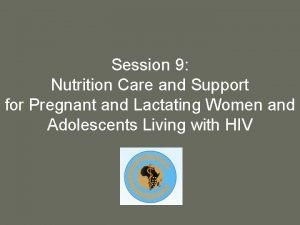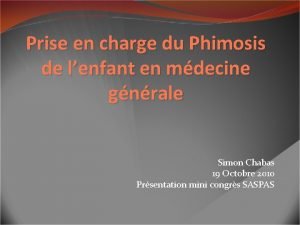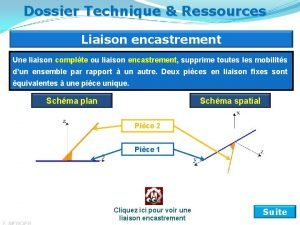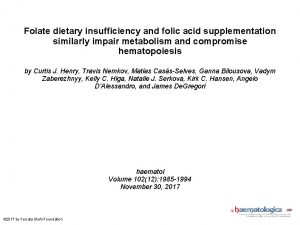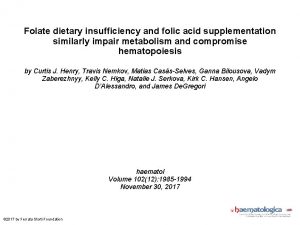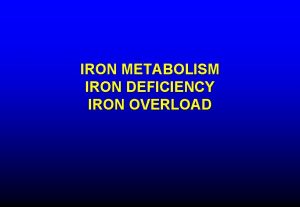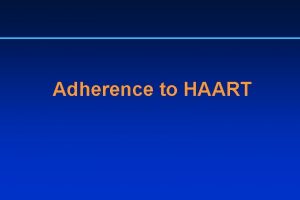Adherence to Iron and Folic Acid Supplementation and













- Slides: 13

Adherence to Iron and Folic Acid Supplementation and Associated Factors among Antenatal Care Attendants in Debre Markos Town, Northwest Ethiopia, 2016 By: Berhanu Abebaw (Bsc, MPH) Yadeta Dessie (MPH, Ph. D) 10/30/2021 Negga Baraki (MPH, Ass. prof) 1

Presentation outlines • Introduction • Objectives • Methods and materials • Result and Discussions • Conclusion and Recommendations 10/30/2021 2

Introduction • Iron and folic acid supplementation (IFAS) is the feasible and cost effective strategy to control and prevent anemia in pregnancy. (FMOH, 2012; Burke et al. , 2014; Wendt et al. , 2015) • In a Rapid Initial Assessment of the Distribution and Consumption of IFA tablets through ANC in Ethiopia, only <1% consumes the ideal number of tablets. (Fiedler et al. , 2014) • The factors contributing to low adherence are not persistent and clearly known. (Samson et al. , 2014; Bekele et al. , 2015; Abel et al. , 2015) 10/30/2021 3

Objectives General Objective § To assess Adherence to Iron and folic acid supplementation and associated factors among pregnant women attending antenatal care in public health facilities of Debre Markos Town Administration, Northwest Ethiopia from March 03 -23, 2016. Specific Objectives • To determine level of adherence of IFAS and • To identify factors associated with IFAS 10/30/2021 4

Methods and Materials • The study was conducted in Debremarkos town Administration, (East Gojjam Administrative Zone) • Health institution based quantitative cross sectional study supplemented with qualitative methods was conducted on ü 395 systematically selected pregnant women • The source population were all pregnant women who took IFAS and visited the ANC clinic during the study period. • Eight in-depth interviews were conducted 10/30/2021 5

Methods and Materials… • An interview with pre tested structured questionnaire was used to collect the data. • Data were entered into Epi - data and exported to SPSS for analysis • Bivariate and multivariable logistic regression were used to identify independent predictors • Qualitative data were entered analyzed using open code software. • Ethical clearance was obtained from IHRERC of HU 10/30/2021 6

Result and Discussions Study Finding Others Finding Possible Explanation Consistence with Ø Adherence rate ü Indonesia (53. 7%) (Wulandari et al. 2013) 55. 5% sed knowledge of PW about anemia and IFAS But Higher than v. NW Ethiopia (20. 4%) (Bekele et al. 2015), Ø Majority of the v. Tigray (37. 2%) (Abel et al. , 2015), & respondents being v. South Ethiopia (39. 2%) (Abient et al. , 2015). urban residents ØThe time gap between studies. 10/30/2021 7

Multivariable Logistic Regression Analysis… 10/30/2021 8

Result and Discussions… Factors significantly associated with adherence to IFAS q History of anemia during current pregnancy (AOR= 7. 9) q Maternal educational status (AOR=4. 0) 10/30/2021 Consistent with üNW Ethiopia (Bekele et al. 2015), üTigray, (Abel et al. , 2015), Ø HCP sed attention on anemic women during counseling which Ø ses clients awareness and knowledge ØClients need to be free from the üKenya (Dinga et al. , 2013) and üTanzania (Ogundipe et al. , 2012). Supported by ü Northwest Ethiopia (Bekele et al. 2015), ü Pakistan (Nisar et al. , 2014), However inconsistent with ü Sudan (Abdullahi et al. 2014), and ü Kenya (Dinga et al. , 2013). illness, and ØFear of anemia complications ü The variation may be due to • Geographical, and • Socio cultural (societal belief about IFAS) difference. 9

Result and Discussions… Factors significantly associated with adherence to IFAS q Knowledge of IFAS (AOR = 2. 1) Supported by ØThe possible reason is that those who had good knowledge of IFAS üEight rural districts of Ethiopia were aware of (Samson et al. , 2014), and ØTablets importance, üIndia (Mithra et al. , 2014). ØSide effect, ØHow it is taken, and ØComplication if missed. q Early registration Supported by for ANC 10/30/2021 (AOR = 1. 8) ü Tigray, Ethiopia (Abel et al. , 2015), ü Ethiopia (Fiedler et al. , 2014), ü India (Wendt et al. , 2015) and ü Indonesia (Titaley and Dibley, 2015). ü The reason may be those who had early registration for ANC services probably had ü Better concern for their pregnancy and ü More ANC visits 10

Major reasons for taking tablets Result and Discussions… 1 st Getting medical advice (94. 1%) 2 nd Fear of illness if not taking the supplement (47. 3%) Findings from the qualitative part also revealed that main reason of consuming the tablets was getting medical advice …“I took the tablets because the health care providers Supported by ü Study conducted in Kenya (Dinga et al. , 2013). This could be due to ü increased knowledge of both anemia and ü IFAS that resulted from proper counseling through (both at health facility and home) told me it prevents medical advice you from anemia and your fetus from diseases. (Pregnant women, age 38) 3 rd Getting family support (18. 2%) Another reason for taking tablets raised by indepth interview participants was getting family support. …”I never missed the tablet, because my husband reminds me to take it”. (Pregnant women, age 38) 10/30/2021 Supported by ü Pakistan (Nisar et al. , 2014). The justification behind is when they get family support, ü They will have an opportunity not to forget the tablets and ü Great concern for adherence. 11

Result and Discussions… Major reasons for missing tablets 1 st forgetfulness (67. 8%) The above finding is also supported by the qualitative part: …” …”Pregnant mothers’ first reason for missing the doses of tablets was forgetfulness, not side effect … since we gave them counseling about side effects” (ANC coordinator, age 25) 2 nd fear of side effect (51. 9%) 10/30/2021 Supported by ü South Ethiopia (Abient et al. , 2015), ü Ethiopia (Fiedler et al. , 2014), and ü South India (Mithra et al. , 2014). Supported by ü Ethiopia (Samson et al. , 2014), ü South Ethiopia (Abient et al. , 2015), ü Kenya (Dinga et al. , 2013), and ü Pakistan (Nisar et al. , 2014). This could be due to v the timing that the tablet is taken. v Findings from the qualitative study revealed that since the tablet is taken at night, they were forced to forget the tablet v Lack of concern for adherence might also lead pregnant women to forget the tablets. This could be due to fear of side effect is probably resulted from v Getting inadequate counseling during medical advice and v Women decreased knowledge of anemia and IFAS. 12

Conclusion and Recommendations • Adherence rate is low. • History of anemia during current pregnancy, maternal educational status, knowledge of IFAS, and early registration for ANC were the predictors to IFAS adherence. • Thus, increasing knowledge of women about the supplementation through adequate counseling, community education and media would increase adherence. 10/30/2021 13
 Folic acid dose in pregnancy
Folic acid dose in pregnancy Folic acid mechanism of action
Folic acid mechanism of action Nitrogen balance definition
Nitrogen balance definition Exercise behavior and adherence
Exercise behavior and adherence Adhérence préputiale traitement
Adhérence préputiale traitement Assemblage non démontable
Assemblage non démontable Liaison complète par tampons tangents
Liaison complète par tampons tangents Declakon
Declakon Negative pressure room
Negative pressure room Mass of iron in an iron tablet
Mass of iron in an iron tablet Iron sharpens iron friendship
Iron sharpens iron friendship Acid fast and non acid fast bacteria
Acid fast and non acid fast bacteria Example of acid-fast bacteria
Example of acid-fast bacteria 9-which acid is not considered a strong acid?
9-which acid is not considered a strong acid?
